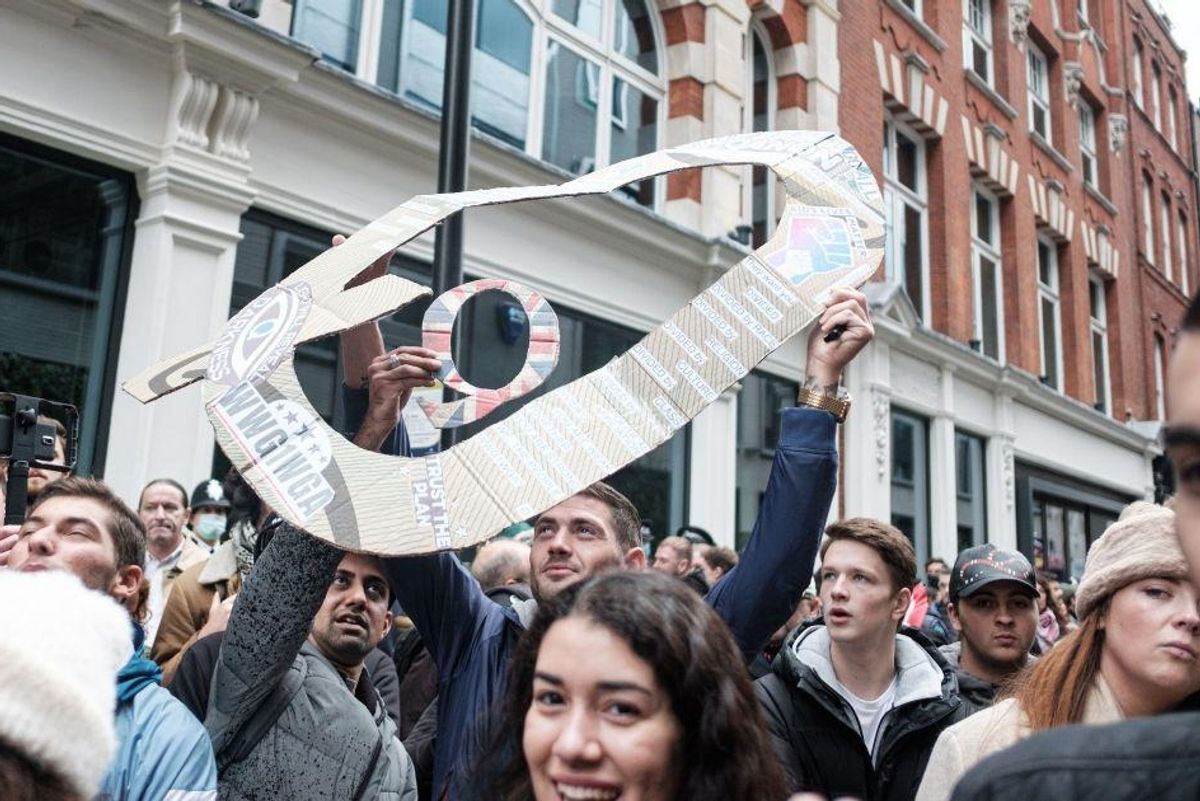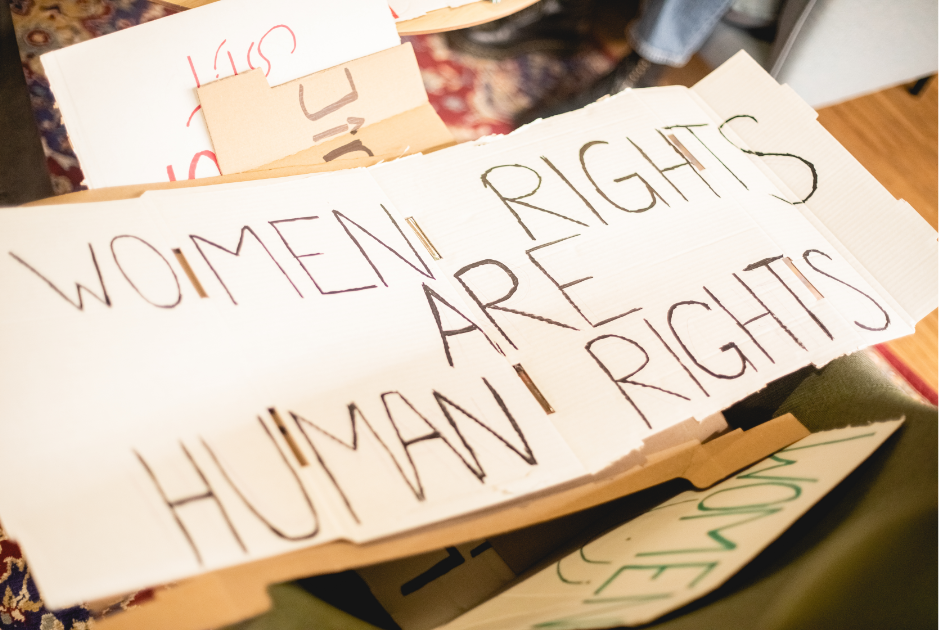A former QAnon believer answers all your questions about how the cult really works
How they lure people in and how he got himself out.

Several years ago, you wouldn't have known what QAnon was unless you spent a lot of time reading through comments on Twitter or frequented internet chat rooms. Now, with prominent Q adherents making headlines for storming the U.S. Capitol and elements of the QAnon worldview spilling into mainstream politics, the conspiracy theory/doomsday cult has become a household topic of conversation.
Many of us have watched helplessly as friends and family members fall down the rabbit hole, spewing strange ideas about Democrats and celebrities being pedophiles who torture children while Donald Trump leads a behind-the-scenes roundup of these evil Deep State actors. Perfectly intelligent people can be susceptible to conspiracy theories, no matter how insane, which makes it all the more frustrating.
A person who was a true believer in QAnon mythology (which you can read more about here) recently participated in an "Ask Me Anything" thread on Reddit, and what they shared about their experiences was eye-opening. The writer's Reddit handle is "diceblue," but for simplicity's sake we'll call them "DB."

DB explained that they weren't new to conspiracy theories when QAnon came on the scene. "I had been DEEP into conspiracy for about 8 years," they wrote. "Had very recently been down the ufo paranormal rabbit hole so when Q really took off midterm for trump I 'did my research' and fell right into it."
DB says they were a true believer until a couple of years ago when they had an experience that snapped them out of it:
"It was a couple of posts made by Q on the chans that seemed highly suspicious because of how ignorant they were of technology. Q posts often had weird syntax as a kind of code
- Kind Of [writing like this] as if there was [a secret] in using brackets To Tell The Truth.
One morning Q claimed to have shut down 7 FBI super computers (named after the seven dwarves no less) via satellite hacking and all the rabid fans ate it up, claiming that "their internet was running a little bit faster)
FBI Super Computer ::SLEEPY::[[OFFLINE]]
alarm bells went off in my head because, come on, that's not how any of this works. Using elementary school syntax form To SpeLl a [[Secret Code ]] felt fishy, and claiming your email in rural Montana loaded faster because seven super computers got shut down by remote hacking was a bridge too far for me. I realized that most of the Q believers I had seen were Boomers with no idea how technology works or people my age with no idea how computers operate. That day, I Googled Q Anon Debunked and got out."

If simply Googling "QAnon Debunked" were enough to get QAnoners to deprogram themselves, why don't more of them do it? That's the tricky part. DB explains several elements to Q belief that keeps people in it. A big part of what primed DB to accept conspiracy thinking was a fundamentalist Christian upbringing.
"Theories about evil evolution, science denial and The End of The world rapture return of Christ stuff is all pretty crazy too," wrote DB, who moved to a more progressive version of Christianity after leaving QAnon behind. "There's a strong link between the two."
There's also some "perverse comfort" in conspiracy theories like QAnon, DB wrote, "because of the false sense of order and purpose it brings to the world. Either the world is a boardgame chess match between Good and Evil forces working behind the scenes, and you might be a pawn but at least you are on The Right Side or you admit that the world is a mess, nobody is in charge, there is no grand battle of good and evil behind the scenes and your life has less purpose and order than you hoped."
They also said overconfidence and arrogance play a big role in people staying in the QAnon world, as well as the belief that you are the one engaging in critical thinking while everyone else is a mindless sheep.
"At this point the problem isn't Q, it's gullible people who lack critical thinking skills and gain a massive ego boost in thinking they have secret in that the sheeple don't know," DB wrote.
"Worth noting, conspiracy thinking hooks the brain because it feels like critical thinking. Even though it isn't."
That piece right there really is key.

As another user explained, the "do your own research" concept works to reinforce conspiracy theories while making people think they're coming to conclusions on their own, thanks to the way search engines and social media algorithms work:
"The idea behind the 'research' is that you are more likely to believe a source if YOU stumble upon it yourself vs if I tell you -go watch this video.
So if I tell you Hillary is a lizard person, watch this video ... It's easy to watch and dismiss me as a crazy that saw a dumb video. BUT ... if I tell you Hillary is a lizard person, but don't take my word for it - google it yourself.... and you come across hundreds of videos and articles about Hillary being a lizard person - that makes it all the more believable. Especially since there's so many articles saying Hillary is NOT a lizard person. If it wasn't true, why would people be making videos and articles 'debunking' it?
And the debunk articles are appearing higher in searches than the articles saying she is. Why is that? Is big tech in on it to ....and you see where this is going.
So their 'research' is just a way of manipulating people."
DB shared that it was hard to admit that they'd been played by a baseless conspiracy theory. "It's NOT easy realizing you've been conned, been a rube, been taken in," they wrote. "It was massively humbling to realize I'd been a sucker."
However, they are also surprised to see how much "crazier" QAnon has gotten, as when they left a couple of years ago they were "certain it would all be over soon." They weren't a "storm the Capitol" kind of believer, but rather a "snicker quietly to myself in my bedroom because those sheeple don't know the truth" type.
DB explained that they keep themselves away from the edge of the rabbit hole now by embracing doubt and different ideas and have added "some fucking worldview humility" to their life.
"The problem with fundamentalist religions, cults, and conspiracy theories is they all demonize doubt and are all so absolutely certain that they have the total truth of reality figured out. I hold my beliefs much more humbly now, I acknowledge that I could be wrong," they wrote.
"I read more widely and expose myself to the ideas of others, so that I don't end up in an echo chamber."
As for how to help others get out? DB said that arguing with a QAnon adherent, especially online, is a waste of time—and their simple explanation for why makes perfect sense:
"I don't think they can be reasoned out of beliefs they were not reasoned into."
There's no way to rationalize with irrational beliefs, unfortunately. DB suggests if you have loved ones who've fallen down the rabbit hole that you maybe try asking them questions using Street Epistemology techniques (which you can read about here), avoid confronting and trying to reason with them (because it's simply not effective), and continue loving them (while setting boundaries about what you're willing to listen to) so they have a stable place to land if and when they are able to extricate themselves.
You can read the entire Reddit thread of Q and A here.
As frustrating as it is to see people we know fall for kooky conspiracy theories, seeing that it's possible for someone to get out offers a ray of hope that they aren't necessarily gone for good.
This article originally appeared four years ago.
- Trevor Noah sheds light on the absurdity of QAnon as only Trevor ... ›
- Child sex trafficking organizations set the record straight on QAnon ... ›
- The QAnon cult: What it is, how it works, and how to help deprogram ... ›
- People cast their vote for which fictional character would make the best president ›
- Are cults amking a comeback? Twitter says so. ›





 What was I doing again?
What was I doing again? A space waitress at work.
A space waitress at work.  Waking Up Funeral GIF
Waking Up Funeral GIF Rihanna Nails GIF
Rihanna Nails GIF Yoga pants.Image via Canva.
Yoga pants.Image via Canva. Our natural lashes are nice just the way they are!
Our natural lashes are nice just the way they are! One step forward, many steps back. Image via Canva.
One step forward, many steps back. Image via Canva.  Homelessness is especially rampant on the West Coast.Image via Canva
Homelessness is especially rampant on the West Coast.Image via Canva